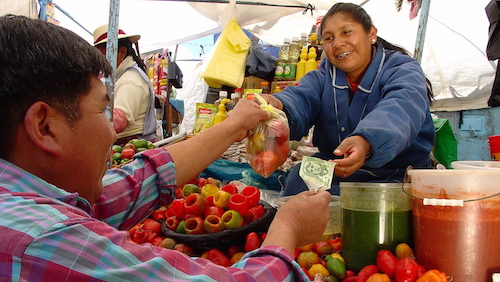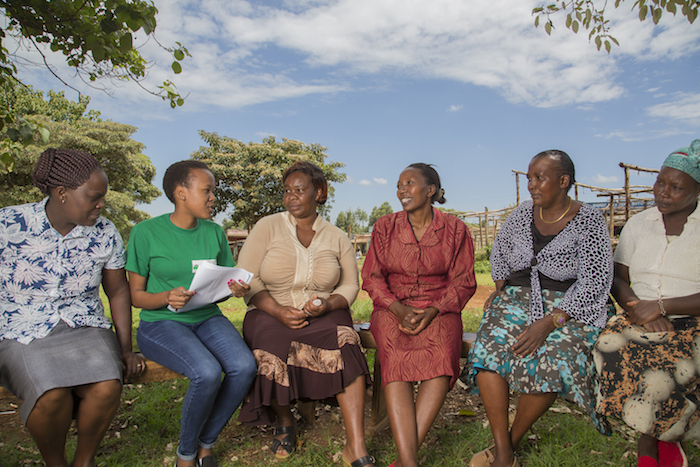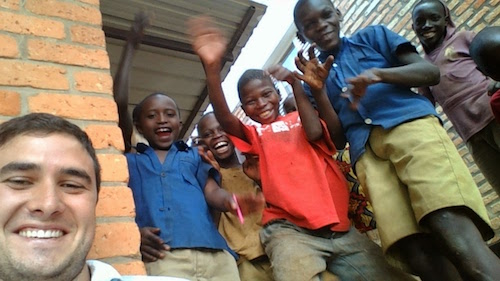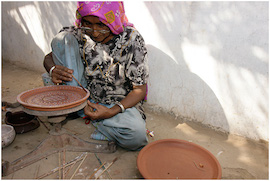
Image credit: Pro Mujer
WDI welcomes Maria Cavalcanti, president and CEO of Pro Mujer – a nonprofit finance organization that has disbursed more than $3 billion in loans to mainly women-owned enterprises in Latin America – to its Global Impact Speaker Series at the University of Michigan next month.
Cavalcanti will discuss Pro Mujer’s business model, which is centered on gender equity, and take questions from attendees beginning at 5:30 p.m., Nov. 15 in room 1560 of Blau Hall at the Ross School of Business. The event is free and open to the public.
Pro Mujer was founded by Lynne Patterson and Carmen Velasco in Bolivia in 1990 to use microloans to support women-owned businesses. Today, the organization works with entrepreneurs in that country as well as Argentina, México, Nicaragua and Peru. In 2015 alone, Pro Mujer reported providing $330 million in loans to more than 250,000 clients. Operating mainly in urban areas and regions just outside major cities, Pro Mujer also provides direct and indirect health care services through a series of centers and clinics. Services include non-communicable disease detection, dental care and ultrasound diagnostics.
 In early 2016, Cavalcanti (pictured left) was named president and CEO of Pro Mujer. She has ambitious plans to expand the organization.
In early 2016, Cavalcanti (pictured left) was named president and CEO of Pro Mujer. She has ambitious plans to expand the organization.
“As we look ahead, we are focused on amplifying our services and expanding our footprint,” Cavalcanti said in an interview with NextBillion.net, WDI’s affiliated media site focused on business solutions in low- and middle-income economies. “By leveraging partnerships and technology, we are building Pro Mujer as a platform capable of serving millions at a time; a one-stop shop for empowerment for women in the region.”
Cavalcanti holds an MBA from the University of Texas in Austin, a master of science in Information Science from Columbia University in New York, and a bachelor of arts from Universidade Federal do Ceará in Brazil. She is based in New York City, where Pro Mujer is headquartered.

A Juhudi Kilimo representative speaks with smallholder farmers. The organization is the subject of one of the case writing entries for WDI’s case writing competition. (Image credit: Juhudi Kilimo)
WDI Publishing received 50 entries from 11 countries for its case writing competition, which is being held to commemorate WDI’s 25th anniversary and its years of work developing private sector solutions in low- and middle-income countries. Completed case studies, and accompanying teaching notes, must be submitted by Dec. 8 and the winners will be announced March 15, 2018.
Of the 50 entries, 41 are faculty and nine are student authors. Three authors entered more than one case, and 12 entries came from faculty members in the Philippines who were trained in case writing by WDI as part of its work on the STRIDE project.
Eleven universities in India are represented in the competition, nine from the Philippines and eight from the United States, including four from the University of Michigan’s Ross School of Business. Other countries represented in the competition are Australia, Canada, Kenya, Russia, Singapore, Switzerland, Ukraine and the United Kingdom.
Case study topics must describe a dilemma or challenge faced by a company or organization related to creating, implementing, evaluating, and/or disseminating market-based solutions in developing countries.
The proposed case studies are set in 17 different countries, including Angola, China, Estonia, Greece, Honduras, Kyrgyzstan, Mexico and the United Arab Emirates.
Some of the organizations and companies featured in the proposed cases include Just Us! Coffee Roasters Co-op, Solar Ear, Tallinna Kaubamaja, Digital Empowerment Foundation, SafeMotos, Juhudi Kilimo and SMART Diaphragm.
“I’m very excited and pleased by the global interest in our competition as evidenced by the demographics of our entrants,” said Sandy Draheim, manager of WDI Publishing. “And the relevance of the proposed case study topics and featured organizations align very well with WDI’s mission and focus. We are truly looking forward to the opportunity to publish and disseminate teaching cases about market-based solutions in developing countries.”
The competition, organized and administered by WDI Publishing was open to individual students or student teams, as long as they entered in collaboration with a faculty member from a degree-granting university or college. Faculty or faculty teams also could enter as long as they were currently teaching at a degree granting university or college.
The first place team or individual will win $3,500. The second place team or individual will win $2,500, and $1,000 will be awarded for third place. Additionally, each winning case will be professionally published by WDI Publishing.
Judges for the competition are: Kim Bettcher, senior knowledge manager at the Center for International Private Enterprise; John Branch, clinical assistant professor of business administration at the University of Michigan’s Ross School of Business; Gautam Kaul, professor of finance and the Fred M. Taylor Professor of Business Administration at Michigan Ross; and, Jordan Siegel, associate professor of corporate strategy at Michigan Ross.
WDI Publishing has organized and administered past case writing competitions. From 2011-2015, NextBillion, an affiliate of WDI, and NextBillion partner Citi Foundation sponsored competitions for the best-written case studies about business strategies aimed at alleviating poverty – especially at the economic base of the pyramid.
This non-confidential version of the report presents the research design and methodology used by the Performance Measurement Initiative in an impact assessment study PMI conducted of Semilla, a project funded by Danone Ecosystem Fund with local partners in Mexico City that employed mainly women from low-income households to sell Danone products through a last mile distribution model.
The study was divided into two parts: a strategic analysis to gain a deep understanding of Semilla’s holistic set of impacts, followed by a performance analysis to identify and track potential improvements in key indicators over time. This methodology ensured that all stakeholders’ voices were heard and incorporated into solutions to improve Semilla’s business model. This version of the report also discusses the data collection experience and the analysis strategy used. It also includes the final survey used to collect the quantitative and qualitative data (found in Annex C). Please note that all confidential material associated with the report has been removed in the document.
Heather Esper, Senior Program Manager of WDI’s Performance Measurement Initiative (PMI), in collaboration with IDB’s SCALA Metrics Lab developed a new framework for boosting the impact of small inclusive businesses and their distribution networks. IDB’s SCALA network is a platform to scale the impacts of inclusive and social business in Latin America and the Caribbean. Through SCALA, anchor companies, microfinance institutions, academia, and non-governmental organizations combine efforts to grow micro‐distribution networks based on micro-franchising models.
The SCALA metrics framework includes a mix of standardized social and business metrics and measures short and long term impacts. These indicators can be tailored to each organization in the network. This report explains:
WDI’s PMI team piloted the framework with three different SCALA micro-distribution organizations in Brazil, Nicaragua, and Peru. For additional information about PMI’s work with the three pilot organizations, see this article.

2015 WDI summer intern Julio Villasenor poses with some Rwandan children. This summer, WDI continues its long partnership with The Ihangane Project at Ruli District Hospital in Rwanda by sending summer intern Nana Asare there for a project.
Six University of Michigan students representing four schools and colleges will spend the summer abroad working as WDI Global Impact Fellows, tasked with formulating a strategic plan, streamlining supply chains, evaluating program impacts, empowering entrepreneurship, developing financial models, and creating a new business model.
The students represent the Ross School of Business, the Ford School of Public Policy, the School of Natural Resources and Environment (SNRE), and Health Informatics, a joint program of the School of Information and the School of Public Health. They will work in Ethiopia, Ghana, India, Kenya, Mexico, Rwanda, and Sri Lanka, and support the work of WDI initiatives in Healthcare, Performance Measurement, and Scaling Impact.
Five of the six summer internship projects were developed by WDI along with its partners. Two organizations – Grace Care Center and the Ihangane Project – are longtime partners with WDI and have sponsored student projects, both internships and Multidisciplinary Action Projects (MAPs), for several years. The work done by the summer interns at these organizations is building on previous projects performed by MAP teams, students in a travel-study course and previous interns all sponsored by WDI.
WDI also supports graduate students who source their own internship projects based on their educational, personal, and career interests provided that the work fall within one of the Institute’s research focus areas. One intern this year, Julia Entwistle, worked with the leadership at ADHENO, a non-profit focused on extreme poverty in Ethiopia, to define the scope of work for her project, then submitted a proposal to WDI for funding.
Entwistle has worked with WDI’s Performance Measurement Initiative (PMI) as she prepares to evaluate the impact of ADHENO’s environmental restoration and economic empowerment programs that operate in the Northern Shewa province of Ethiopia. PMI provided multiple rounds of feedback on the survey Entwistle has developed to conduct the impact assessment this summer.
“PMI hopes that the project will lead to new measurement-related learnings, especially related to environmental metrics and assessment,” said Heather Esper, senior program manager of the initiative. “PMI also is hopeful this work may lead to possible future collaborations with the organizations involved, including SNRE faculty.”
Here are the interns and their projects:
Nana Asare
Ruli, Rwanda
The Ihangane Project (TIP) empowers local communities to develop sustainable, effective, and patient-centered health care delivery systems that holistically respond to the needs of vulnerable populations. Partnering with Ruli District Hospital and its associated health centers, TIP is working to identify key strategies for improving health outcomes.
Since 2009, TIP has worked with WDI and the Ross School of Business to find ways to improve Ruli’s communication flow, cost-effectiveness, and financial sustainability. In winter 2016, Ross students worked with Ruli and TIP to develop a problem-solving framework designed to encourage hospital staff to proactively address challenges at the hospital. The students also created a curriculum and agenda for presenting this framework to staff members during a hospital retreat. That summer, a WDI summer intern helped Ruli and TIP successfully conduct the retreat.
Ruli has now turned its attention to formulating a strategic plan that reflects the priorities of the hospital and community, while also addressing the requirements of the Rwanda Ministry of Health. This past winter, Ross students created a framework for a hospital staff to use in developing a strategic plan during a retreat.
Asare will support the hospital staff to ensure a successful summer retreat. He also will help implement recommendations developed at the retreat, create a roadmap that can build upon the strategic plan developed at the retreat that will guide future projects, and evaluate the effectiveness of the retreat.
Karen Cuenca
Ford School of Public Policy
Mexico City, Mexico
Value for Women (VFW) is a UK-based social enterprise operating in Latin America, Africa, and Asia that works with partners to improve gender and social inclusion. Their specialists provide tailored technical assistance and capacity-building expertise to impact investors, banks, multinational companies, and NGOs, to deepen the inclusion dimension of their business models, value chains, programs, and products and services.
With supply chains in the agriculture sector increasingly under strain, the inclusion of women is critical, and smallholder farmer associations and small- and medium-sized enterprises (SMEs) have an opportunity to strengthen their role as suppliers to corporate entities.
Cuenca will conduct a situational analysis to understand and assess the current position of women in agriculture supply chains in Mexico, and recommend opportunities for improving gender inclusion in agriculture organizations and supply chains in Mexico.
Ann Duong
Becton, Dickinson and Company (BD)
Nairobi, Kenya and Addis Ababa, Ethiopia
Bangalore, India
Becton, Dickinson and Company (BD) is a global medical technology company working to improve medical discovery, diagnostics, and the delivery of care. BD actively engages with the U.S. President’s Emergency Plan for AIDS Relief (PEPFAR) to improve overall laboratory systems and services in African countries severely affected by HIV/AIDS and TB. This initiative is a public-private partnership with the U.S. Centers for Disease Control and the Ministries of Health in Ethiopia, Kenya, Mozambique, and Uganda.
Through both field-based and domestic work, Duong will be supporting implementation of the technical impact evaluation of the BD-PEPFAR program, Labs For Life: Strengthening Laboratory Systems in Developing Countries.
Following this project, Duong will travel to Bangalore, India for a short project with iSPIRT, a software product think tank that has been working with numerous start-ups in the development of IndiaStack. IndiaStack is an exciting set of technologies governments, businesses, and others utilize a digital infrastructure, creating a paperless and cashless service delivery model that is being integrated into India’s economy.
Duong will work with iSPIRT to connect and study various companies and start-ups that are utilizing IndiaStack’s APIs. After returning to Michigan, she will analyze this information in order to generate key insights into how stack technology can be used to enhance healthcare access and delivery.
Julia Entwistle
School of Natural Resources and Environment
Addis Ababa and Debre Berhan, Ethiopia
ADHENO implements various environmental restoration programs such as tree planting to slow the desertification process, soil protection measures such as terracing, and improving agricultural resilience through irrigation, water conservation, and crop diversification, to combat environmental degradation that negatively impacts agricultural productivity and revenue in Ethiopia. The organization also operates economic empowerment projects to support microenterprises such as beekeeping, animal rearing, basket weaving, and traditional spice processing to diversify the economy and include women in the workforce.
Entwistle will conduct an impact evaluation of ADHENO’s environmental restoration and economic empowerment programs that operate in the Northern Shewa province of Ethiopia. The organization wants a comprehensive evaluation of its work before rolling out the programs to more rural sub-districts in Ethiopia.
Danielle Wilkins
School of Natural Resources and Environment
Trincomalee, Sri Lanka
The Grace Care Center (GCC) is a home to about 70 orphaned children that offers daycare services and vocational training. It also is home to several poor and displaced seniors, many of whom have chronic health issues such as hypertension and diabetes.
Based on past work by MBA student teams from the Ross School of Business, GCC developed a diabetic care center model. Trained para professionals acquire data relevant to diabetes, which are sent to the University of Michigan to be tabulated and analyzed to segregate patients into risk categories. The medical data from 100 diabetes patients have been monitored and analyzed for the past five months.
A long-term, sustainable economic model needs to be developed and then subjected to a pilot test to ensure that the model has taken into account all the parameters. The end goal is a successful economic model that could be replicated in other parts of the country.
Wilkins will build upon the past work of her fellow U-M students to identify and develop a pricing strategy, build an economic model (subscription vs. government funded), and set up the pilot to test the chosen model.
Tim Yuan
Department of Mechanical Engineering, University of Michigan
Kumasi, Ghana
One of the applied projects in the Department of Mechanical Engineering’s lab is a solar e-trailer in collaboration with Pratt and Miller Engineering. The overarching goal is to demonstrate that transportation services enabled by affordable, low-speed, solar-powered electric vehicles (EVs) can improve the quality of life of the residents in the villages in Africa and the other developing countries. In 2016, a working prototype of a solar bicycle e-trailer was developed along with a preliminary business model.
Yuan will develop a market-entry strategy for the integrated transportation, electricity charging, and usage data collection services provided by solar bicycle e-Trailers (or similar small-sized solar EVs). He also will build a sustainable business model for manufacturing, distributing, and leasing such vehicles in villages and cities in Ghana.
As part of his continuing series, Nathan Rauh-Bieri checks back in with participants in the year-long Vital Voices GROW Fellowship. In a world growing more “virtual” by the day, he learned there’s still plenty of value in entrepreneurs meeting face to face.
WDI’s Scaling Impact Initiative is working with Walmart to chronicle what the retail giant has learned from its efforts to include small producers in global supply chains.

The successes, challenges, and lessons learned will become a policy brief and a teaching case, both written by WDI in collaboration with Professor Linda Scott of Oxford University’s Said Business School. Both documents will be published this spring, and are geared toward Walmart and other retailers looking to develop more effective sourcing programs in the future.
WDI Vice President of Scaling Impact Ted London and Research Manager Colm Fay, along with Scott, are studying two Walmart programs.
One is Empowering Women Together, which sources handicrafts from women-owned base of the pyramid businesses in East Africa, Nepal, India and other emerging markets to sell online. The other is Direct Farm, which buys fresh fruits and vegetables from small- and medium-sized farmers to supply Walmart’s stores in Central and South America, Mexico, South Africa, and India.
The team has interviewed managers from Walmart, the Walmart Foundation, and their implementing partners.
This is the second collaboration between WDI and Walmart. Last year, WDI Publishing released a case study on the evolution of a global cross-sector partnership between Walmart and the United States Agency for International Development (USAID). The case looked at what had been gleaned – both positive and negative – during the 15-year collaboration between the two organizations.
The free case, “Walmart and USAID: The Evolution of a Global Cross-Sector Partnership,” focused on partnerships that sought to engage smallholder farmers in the developing world, and highlighted examples from Honduras, Guatemala, Rwanda and Bangladesh. It explored the ways in which these collaborations came about, how they were supported by the partners, and the level of success achieved as measured by Walmart, the Walmart Foundation, and USAID.
The case also identified lessons learned for the future of the Walmart/USAID collaboration, and insights that may apply to the development of public-private partnerships for development more broadly.
In addition, NextBillion’s Kyle Poplin wrote a post on how the case was developed. And Beth Keck, senior director of Women’s Economic Empowerment at Walmart, sat down for a video interview with WDI’s London about the company’s global work.
Image courtesy of Navel Zaveri/Flickr.
Case study on the impact of Patrimonio Hoy on alleviating poverty on children age eight years and younger. Patrimonio Hoy provides construction materials to low-income consumers in Mexico, Nicaragua, Costa Rica, Colombia and the Dominican Republic through a 70 week payment plan that allows its customers to build onto their current homes or build new homes room by room.
Assessment of the role BoP ventures can play in alleviating poverty on children age eight years and younger. This article aggregates impact findings across the six ventures including businesses that sell a product to the BoP, businesses that sell a service to the BoP, and businesses that source from the BoP. The ventures analyzed, work across a range of sectors including housing, renewable energy, sanitation, health care, as well as export-based and locally-based agribusinesses. It compares and contrasts the types of impact experienced by children across different stakeholders, both within the venture and across the six ventures.
Banorte Bank is the primary subsidiary of Grupo Financiero Banorte, one of Mexico’s largest and oldest financial institutions and has been present in Mexico since 1899. Student intern Sophia Kittler designed financial products for small and medium-sized enterprises (SMEs) owned by women.